a post I made on facebook goes like this: "walking
past the people in the train station working for the watch tower
(jehovah witness propaganja bulletin), the headline I read was asking me
"can anyone dead come back to life?" and my immediate response to mind
was that there is no death; there is only transformation. you stop
moving, die, decompose, everything you once were is scattered and shared
out -- you don't care: you are dead; this is equanimity. you compost
your mother's body into the soil, the fungus and the bacteria
convert you -- you always were all of this anyway, in many incarnations
--your ex-body in osmotic molecular dispersal seeds the spore of
variants --you feed a tree in the forest your strange chemical cocktail
and it becomes one day a pencil you write with..."
the post just mentioned, pasted above, had been shared by 6 people, although I don't know who these people were nor what they thought about it. but anyway, I decided, assuming
that this was actually shared, hoping that my further comments about it might reach them, I added the following:
" Reflecting upon this scene again, while reading a book by Italian philosopher
Giorgio Agamben called "Opus Dei" (about the history of Christian liturgy,
the act of liturgeos, not about the organization
bearing that name Opus Dei), it would appear that even the work of evangelists,
who one might not trust, do in fact perform functions that activate
intelligence, reflection, conscience and compassion in discovering the
truth of the spirit through the immanence of the divine itself, manifest
as the truth of the matter, the matter of the truth, being as it comes
to us, considered to be literally endless and therefore factually that
death only represents an abandonment of borders. And reading Keats
letters on The Vale of Soul-Making, I found my thoughts concerned with
experience and the soul, as Keats lays it out, a soul that only creates
itself through a work inside coincidentia oppositorum, a struggle to
define personal and eternal truth in the balance of a living and dying
moment."
As a result of this thread of research, I decided the new album (one of the 4 recorded in October 2022) should indeed be entitled The Vale of Soul Making"
https://jeffgburekprojects.bandcamp.com/album/the-vale-of-soul-making
Jeff Gburek. Featuring the poetry of William Blake & Stephen Ellis.
The following days I wrote poems and posts with poetic or philosophical, reflective content, as is my norm and I also noted, again, that I am not a magnet, not of great magnitude anyway, for LIKES OR LOVES and that my inability to garner readership or listeners did not matter one iota since I had the recent revelation that this writing was like singing, singing a song to myself, which is good, in and of itself, and that performing (externalization) in this theater of simulacral communications called SOCIAL MEDIA is in fact a very good way of making first drafts, statement that can in fact be elaborated upon, clarified, in my blog, moving, I hope, inexorably, slowly, towards creating the book or books I will eventually publish in the next few years, inshallah. So here are some of those poems and reflections, works in process.
==
who created the star broad enough to metabolize your oblivion?
search heaven for what star systems inform my body's electricity
and
you will find several several specific binary tripolar eccentricities
convulvulus of wild fowl chases you across galaxies only to sleep in the guardian womb
photosynthetic caverns of leaves & the underground atelier
beavers, nutria, vivaporous tree-eater mammals
many a-thing eats down the chain
nature abhors any object, is what I mean
break it down for me. not so simple.
erosion is our star, orbitans,
lightning from jupiter
the shoreline of my mental systems shape-shifting
depends on the defiance of boundaries death compels
bringing things down to the minimal we others absorb
and I want to wail the reedy blues of the orbatids unsung
secret killer of grasses and manufacturer of soils
but after a certain intellectual treeline preconception dissolves
prosecco goes flat, the net goes down in the middle of the film
it's like meeting johnny depp too late in life for it to matter
yes, even jolie or jaylo! even shakira! maybe beyonce?
news comes in deflagration of war, raises the price 900 x
all that glitters comes up in body bags and nagual
shadows of meaning, blood-hounds rambling,
that box of coupons, lottery tickets and collage cuttings,
those 5 other guitars you never play, 250 bottles of nail polish,
all goes becky noddy as ballast to the overburdened seas
there's no time to play freebird, everybody's headed for the door
without coats until in the absolute outside kelvin degrees
demand the whole collapse of vital stars scatter brinkmanship
into skid-marks, skid-rows, scamper van grunge,
a survival sign in neon flashes
with the S gone dark
UR-VIVAL
UR-VIVAL
UR-VIVAL
on which form the Ozymandian ridge of sand
shifting in the off-light of post-nuptial
nautical twilight
blindly blinks
&... despite knowing coffee is bad for me,
a cuppa'd be fine just now
rather than the corroded domes & megaphones of disaster
if only we had enough time the holy ghosts might save us
or maybe, given enough time, maybe the trees
spores, doors, reddy skirts be hangin
near the spruce
travelin' up the calves
==
music is freedom itself as dance living dying into mycomass always flowing
great hydras of terraforming cryptobiotic soil on the birthday of Arthur Rimbaud
mingling undulations siphoning idiosyncracy crapshoots
mon ultra somnolent itinerant cactus
my music never over
here
but lion's mane mycelial
sporadic mutant blossom
ready now to dusk
as visions come to jacob boehme
far too early bohemian
fathoms of mothers gather their moss
build the braintree's leaves
prepared pinnacle
pineal acorn
nut squat
stored by squirrels
doffs its cap --
it's almost Spring
inside the Ice
==
Wait for daylight but dance the darkness until then
One of my friends commented:
"One can feel safe in the dark. Here it is eating the girl. Why?"
Bioluminescence!
---I answered:
here's it the green darkness, the cast off light of photosynthesis. I
don't know why. About anything. But that dance is the art of the
greatest symbolic of all time because it engages all the faculties and
leaves nothing behind. As it brings all things on physically forward, through the messages of one's own being, there in all contact with all others and unknowns...
Reflecting upon poetry and poets, I googled the name of Duncan McNaughton
and found an intriguing statement by him and posted it, without quotation marks, to my FB wall
"...Words
do or don’t do the work of the poem—they are, as Jack Spicer said in
his second letter to Lorca, “what we hold on with, nothing else.” The
work of the poem, McNaughton writes, “is not in any sense a job for
rhetoric, in order to gain efficacy of persuasion, to gain social affect
i.e. power. . . . Language and discourse, specifically generated by the
advent of writing itself, are in the agency of power. . . . It is like
Alice Notley said, words aren’t language—they never were..."
A friend replied: Maybe
I'm missing context here. What do you mean by "What we hold on with?"
Sort of a passionate drive i.e. Lebenstrieb? And what are words then, if
not sign symbols to communicate through "language"? And the last point:
"Discourse or language can't be creative
expression(s), as they are tools in domains of power as per your
sources" or "single words don't make a language"? Will check these
authors – sounds very interesting albeit cryptic due to the lack of
framing.
So, I had this to say. Well,
first thing comes to mind is poets and how simply we know that we could
never write (or even think) anything if it depended on grammar, just
woids, theories of the sign, social approval, rhetoric -- all the linear
framings of englightenment and post-enlightenment
modes of reason and discourse. there is a passage from primo levi that
comes to mind to me next where he describes one of his fellow inmates in
auschwitz, known only by his number, null achtzehn, as the empty
involocru of a insect blown by the wind but connected still to a rock by
a single frail thread spun from it's own former body. that's where
poetry allows for an almost superhuman power against the most inhumane
forces imaginable. it remains cryptic because no one can explain it; and
those who try to do so suffer the loss of a resource that perishes when
exposed to certain forces of modernity -- like those freschi in the
fellini movie -- poetry is not the image, the art, but the medium, the
glue, the gluon in physics, that allows the pigments to cohere invisibly
-- I wouldn't call it Lebenstrieb because it's not personal, it's not
related to egoity nor corporal identity, not even to life so simply
framed by one body or body of bodies -- I think a lot of people think
it's like Chomsky's generative grammar or something but when I read his
ideas about language, they don't seem to be covering the same field of
energies. Well, that's the best I can come up with for the moment.
Thanks for the question and for your curiosity
Context
perhaps helps to some degree (to provide my sense for it). For example,
if you know that the poet Jack Spicer wrote his letters to Lorca in the
60's long after Lorca was dead and that Spicer lectured on magic and
poetry used metaphors of mediumistic messaging services, like the radio
in Cocteau's Orpheus film, maybe something of a pre-post-modern
materialistic rhetoric based poetry can start to be seem in some depth
of perspective. Poets often do not speak to nor need to speak to the
living, alhough our use of material audible and visible to the living
allows them to overhear our (often hit or miss) transmissions to one
another. Some guiding principle in this.
This all lead me back to contemplating Olson's "the dead prey upon us for rest" and how this particular path in art where you are not creating works to convince the living people to some point of view, how the art of poetry and music in the service of the ecology of healing ancetral trauma for Seven Generations Forward and Seven Generations Back...how this is very different than being popular or influential politically --I wrote the following:
"if
you tell people you are in coversation with the spirits of the other
worlds, the dead, and listen to the voices of other species, you can
remove a lot of the bullshit talk from your life. it's very liberating.
we never made art only for people presently alive. I know very well
after a decade or so of university education (and life among educated
technician artists) how the idea won currency that art is about the here
and now, your community, your human life, this materialistic
paradigm, your techniques: it's is very easy to trace. and yet, all
indigenous peoples had their universities of forests and mountains and
seas and oceans. we all were once something like indigenous people, even
nomadics. we owe our work more to the future and past works of the
earth than we do to those whose sense of career inside capitalistic
market paradigms prevent them from undestanding the scope the poetics we
are bound to... because our happiness depends on expressing the truth"
Afterwards I found this strange passage in an interview with Peter Sloterdijk
𝐆𝐨𝐝 𝐈𝐬𝐧'𝐭 𝐃𝐞𝐚𝐝. 𝐎𝐫𝐠𝐚𝐧𝐢𝐬𝐦𝐬 𝐃𝐢𝐞. 𝐍𝐨𝐭 𝐆𝐨𝐝. 𝐇𝐞 𝐈𝐬 𝐍𝐨𝐭 𝐀 𝐋𝐢𝐯𝐢𝐧𝐠 𝐁𝐞𝐢𝐧𝐠
“I
am absolutely a believer. Faith and life are synonymous functions. If
you don't believe, you can't finish a sentence, for example.
Speechlessness is the clearest sign of depression. In this respect,
depression and disbelief converge. The title of my book "Nach Gott" (2017) was deliberately chosen to be ambiguous. The "nach" (after) can be read in a temporal sense: God is a thing in the past.
But
"nach" also means "according to" or "as a result of". So we are at a
fork in the road. There are increasing numbers of atheists today. Yet
countless numbers still live under the religious umbrella.
God
is still a key term for a psychosemantic immune system, a reference
point for internal and external actions in an unsecured world. Nietzsche’s “God is dead”
also hints at the continuing presence of God. The dead don't disappear
completely, but have their place in the imaginary world. God lurks
behind the hill, from there the living can sense him.
The
divine eye, perpetually observing, dwells in modern man in the form of
conscientious introspection. Moreover, strictly speaking, God cannot be
dead. Organisms can die, but not God, for he is not a living being. So being dead is a metaphor for God's loss of meaning. But
people still feel a longing for divine observation today – to be seen. A
clear symptom is the social media and the communication mania that is
revealed in it.
The
vertical observation by God has been replaced by the horizontal
observation by others whose gaze one surrenders to oneself. All of
modern society, especially through modern communications technologies,
has become a huge side observation context. In
fact, people are gripped by a "reverse panic": While pre-modern people
were still afraid of divine observation, modern people are not afraid to
be seen. They crave it. They are constantly looking to get in touch with the kind of observation before which one's own existence flourishes."
(Edited
and translated excerpt from interview with Sloterdijk on
Deutschlandfunk Kultur radio program August 27, 2017 on the occasion of
the publication of his book “Nach Gott”)
On the Earth
Art? Go make an old growth forest and ask me to come to the opening!
--- you will die before then! I will not waste my invitation, said someone.
--- but it depends depends
on how deep you can go into the fecundity I guess... It's all a play of
different tempi, different scales of time... Even in the park nearby
there are trees 3 times my own age and they are still youngsters...
Whereas the mites munching on the decaying leaves
have tiny life cycles compared to even a dog or cats. It's all very
funny. This thing called time
I will invite my body to feed the moment




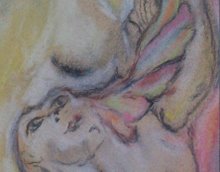



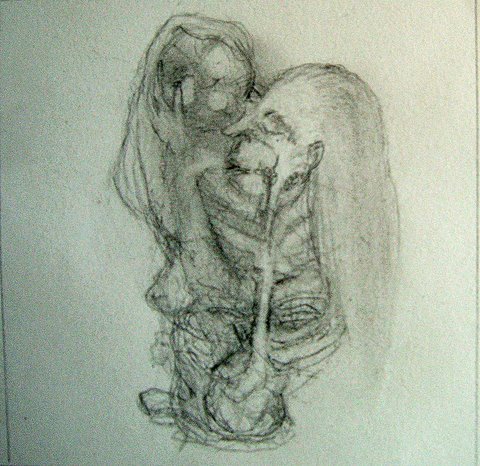
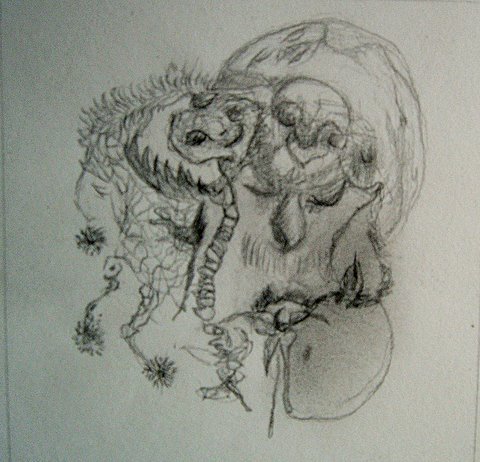
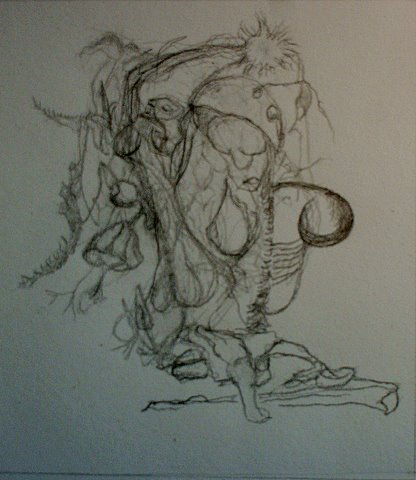
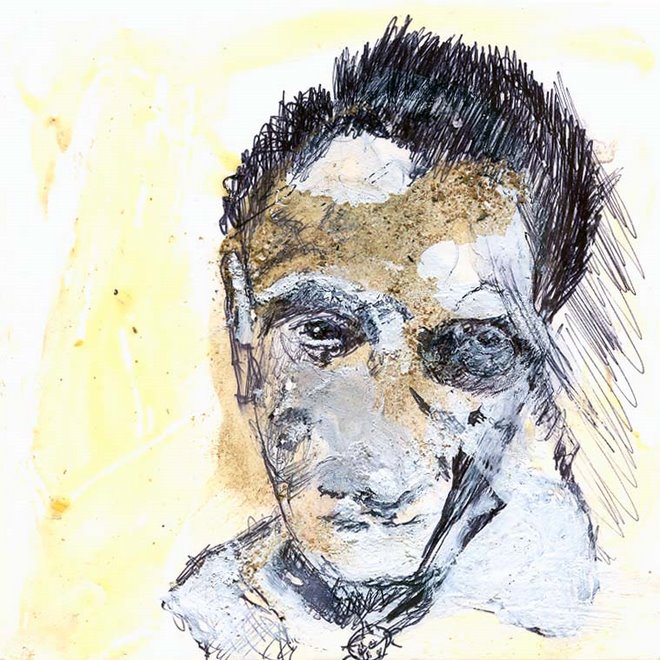
No comments:
Post a Comment